#Exodus 2
Explore tagged Tumblr posts
Text

Pharaoh’s Daughter Adopts Moses
1 A man from Levi’s family married a Levite woman. 2 The woman became pregnant and had a son. She saw how beautiful he was and hid him for three months. 3 When she couldn’t hide him any longer, she took a basket made of papyrus plants and coated it with tar and pitch. She put the baby in it and set it among the papyrus plants near the bank of the Nile River. 4 The baby’s sister stood at a distance to see what would happen to him.
5 While Pharaoh’s daughter came to the Nile to take a bath, her servants walked along the bank of the river. She saw the basket among the papyrus plants and sent her slave girl to get it. 6 Pharaoh’s daughter opened the basket, looked at the baby, and saw it was a boy. He was crying, and she felt sorry for him. She said, “This is one of the Hebrew children.”
7 Then the baby’s sister asked Pharaoh’s daughter, “Should I go and get one of the Hebrew women to nurse the baby for you?”
8 She answered, “Yes!” So the girl brought the baby’s mother.
9 Pharaoh’s daughter said to the woman, “Take this child, nurse him for me, and I will pay you.”
She took the child and nursed him. 10 When the child was old enough, she brought him to Pharaoh’s daughter, and he became her son. Pharaoh’s daughter named him Moses [Pulled Out] and said, “I pulled him out of the water.”
Moses Commits Murder and Flees to Midian
11 In the course of time Moses grew up. Then he went to see his own people and watched them suffering under forced labor. He saw a Hebrew, one of his own people, being beaten by an Egyptian. 12 He looked all around, and when he didn’t see anyone, he beat the Egyptian to death and hid the body in the sand.
13 When Moses went there the next day, he saw two Hebrew men fighting. He asked the one who started the fight, “Why are you beating another Hebrew?”
14 The man asked, “Who made you our ruler and judge? Are you going to kill me as you killed the Egyptian?” Then Moses was afraid and thought that everyone knew what he had done.
15 When Pharaoh heard what Moses had done, he tried to have him killed. But Moses fled from Pharaoh and settled in the land of Midian.
Moses Marries Zipporah
One day, while Moses was sitting by a well, 16 seven daughters of the priest of Midian came. They drew water and filled the troughs to water their father’s sheep. 17 But some shepherds came and chased them away. So Moses got up, came to their defense, and then watered their sheep.
18 When they came back to their father Reuel, he asked them, “Why have you come home so early today?”
19 They answered, “An Egyptian rescued us from some shepherds. He even drew water for us and watered the sheep.”
20 Reuel asked his daughters, “Where is he? Why did you leave the man there? Go, invite him to supper.”
21 Moses decided to stay with the man. So Reuel gave his daughter Zipporah to Moses as his wife. 22 She gave birth to a son. Moses named him Gershom [Foreigner], because he said, “I was a foreigner living in another country.”
The Israelites Pray to God during Their Suffering
23 After a long time passed, the king of Egypt died. The Israelites still groaned because they were slaves. So they cried out, and their cries for help went up to ELOHIM. 24 ELOHIM heard their groaning, and ELOHIM remembered his promise to Abraham, Isaac, and Jacob. 25 ELOHIM saw the Israelites being oppressed and was concerned about them. — Exodus 2 | Names of God Bible (NOG) The Names of God Bible (without notes) © 2011 by Baker Publishing Group. Cross References: Genesis 8:1; Genesis 11:3; Genesis 24:11; Genesis 29:3; Exodus 3:1; Exodus 3:7; Exodus 4:31; Exodus 6:16; Exodus 15:20; Numbers 12:1; Jeremiah 34:9; Jonah 1:9; Acts 7:20-21; Acts 7:23-24; Acts 7:25-26; Acts 7:35; Hebrews 11:13-14; Hebrews 11:24; Hebrews 11:27; James 5:4
Exodus 2 Bible Commentary - Matthew Henry (complete)
Key Passages in Exodus 2
1. Moses is born, and placed in a basket in the reeds of Nile. 5. He is found, and brought up by Pharaoh's daughter; 7. who employs his mother to nurse him. 11. He kills an Egyptian. 13. He reproves a Hebrew. 15. He flees into Midian, and marries Zipporah. 22. Gershom is born. 23. God respects the Israelites' cry.
#birth of Moses#Adopted by Pharaoh's daughter#Moses kills an Egyptian#Moses flees to Midian#Moses marries Zipporah#God hears Israel's cries#Exodus 2#Book of Exodus#Old Testament#NOG#Names of God Bible#Baker Publishing Group
12 notes
·
View notes
Text
God Will Make a Way (Exodus 2:1-10)
No royal edict can defeat the resilient strength of maternal compassion.
Moses is saved from the water by Pharaoh’s daughter, by Marc Chagall, 1966 Now a man from Levi’s household married a Levite woman. The woman became pregnant and gave birth to a son. She saw that the baby was healthy and beautiful, so she hid him for three months. When she couldn’t hide him any longer, she took a reed basket and sealed it up with black tar. She put the child in the basket and set…
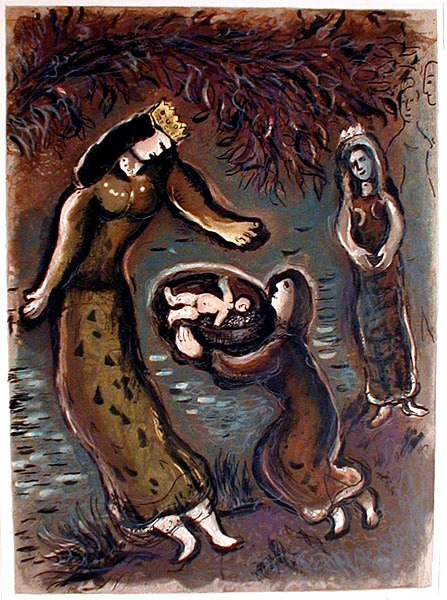
View On WordPress
#afraid#care#compassion#divine sovereignty#exodus#exodus 2#faith#fear#god with us#god&039;s presence#god&039;s promises#god&039;s protection#god&039;s providence#god&039;s provision#hope#love#moses#oppression#pharaoh#spiritual life
0 notes
Text
HER STORY: Season 3, Exodus Pioneers, Miriam
Trauma had warped her in ways she did not even realize, until God drew out what had been festering within for so long. #BibleStudy #Miriam #Prophetess #Exodus2 #BookofExodus #Leprosy #Moses #Aaron #Bible #BrokenSearchingTrustedPowerful
#BibleStudy #Miriam #Prophetess #Exodus #BookofExodus #Leprosy #Moses #Aaron #Bible #BrokenSearchingTrustedPowerful As the book of Exodus opens, life was bitter for the Hebrew people. They were treated harshly and cruelly, dreaded by the Egyptians who enslaved them. Only two sympathetic midwives stood between the Hebrew baby boys and death, and now came Pharaoh’s edict to all Egyptians – throw…

View On WordPress
#Aaron#Bible#Book of Exodus#Exodus 2#Leprosy#Miriam#Moses#Prophetess#Woman of God#Woman of the Bible
0 notes
Text
Church notes - May 2023
On LiveJournal: https://fardell24.livejournal.com/587749.html
On Dreamwidth: https://fardell24.dreamwidth.org/786971.html
0 notes
Text
Daily Prayer for the Lord's Day, April 23, 2023
Prayer: Our most glorious and majestic God in heaven, we come to You today, humbling ourselves before Your throne and before Your face, acknowledging to You that You are God and there is no other. In the space of six days, You made heaven and earth, the seas, and all that is in them. On the seventh day, You rested from all your labor and set before us an example to follow that we, too, would come…

View On WordPress
0 notes
Text
reblog for more answers? this is about all games, very broadly. even if you change it mid game or at some points, what's the one you usually play the most? feel free to make clarifications if you want in the reblogs/replies :] also, this is obviously judgement free. all options are completely fine, we're all different and have different interests.
#dragon age#da#dao#da2#dai#datv#da4#dav#dragon age origins#dragon age: origins#dragon age 2#dragon age ii#dragon age exodus#dragon age: exodus#dragon age: inquisition#dragon age inquisition#inquisition#dragon age: the veilguard#dragon age veilguard#veilguard#the veilguard#dragon age poll#bioware#ea#electronic arts#datv pre-release
506 notes
·
View notes
Text

And you thought his written manifestos were bad…
#dragon age#dragon age 2#dragon age ii#dragon age hawke#dragon age fenris#dragon age anders#dragon age meme#da2#da2 fenris#da2 anders#fenris#anders dragon age#dragon age exodus#kirkwall#thedas#dragon age mages#bioware#hawke x anders#hawke x fenris
923 notes
·
View notes
Text
Merrill during The Last Straw ...
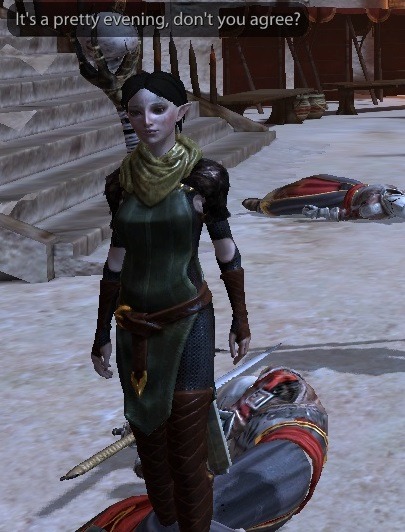
#🤣🤣#actually the templar corpses are lovely to see so yeah you know what I do agree!#Merrill#freedom is coming! everyone rise up on this beautiful evening! the revolution is here#the last straw#jokes aside this is just one of the many things that show how rushed the ending was#this is the final quest of the game the big climax and they didn't give them unique lines to say when we click on them#just generic night time dialogue#dragon age exodus#dragon age 2#Dragon Age II#Dragon Age#da2#hilarious#funny#my post#my posts#daedit#da mine
683 notes
·
View notes
Text


today marks 3 years since i started xiv!! look at how much they've grown 🥹💖
#final fantasy xiv#final fantasy 14#ffxiv#ff14#au ra#xaela#roegadyn#sea wolf#femroe#original character#oc#oc: sathoeya#oc: sayana#i started right when endwalker dropped..........so wild i really sat through 2 hour queues just to get to exodus askdfjaksda
37 notes
·
View notes
Text

made a meme to show my current state
#meme#metro 2033#metro last light#metro exodus#bioshock#bioshock 2#bioshock infinite#i put the first games there but i'm really just referring to the entire series#i'm so obsessed
56 notes
·
View notes
Text
Devotional Hours Within the Bible
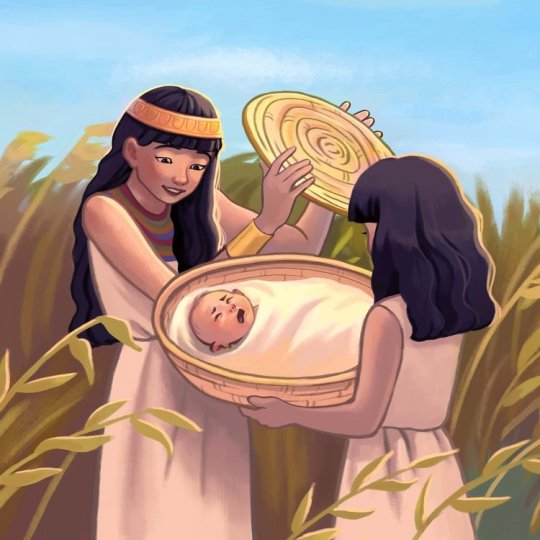
by J.R. Miller
The Childhood of Moses (Exodus 2)
Everybody is interested in a baby that is, everybody who has a gentle heart. The babies of the Bible are especially interesting. Next to the infancy and childhood of Jesus, perhaps no Bible baby interests us so much as the infant Moses in his basket among the rushes.
We must bring up a little of background of the story. Pharaoh became alarmed at the rapid growth of the Hebrews. He determined to check their increase. He tried to do this, first, by making the people slaves, reducing them to bondage. He made them toil on the public works. He set taskmasters over them and compelled them to work in building storage cities. The intention was, by the burdens put upon them, to wear them out and check their increase. But the more he afflicted them the more they grew. Yet more rigorous was the service made and the more bitter the cruel bondage. But all availed nothing. They still increased marvelously.
Then a still more barbarous scheme was ordered. Every male infant was to be killed, cast into the Nile. It was while this edict was in force that Moses was born. The prospect was not bright for the child’s future. But when God has a purpose and a work for a life, men’s schemes do not avail. The king was no match for God.
It is a beautiful story we are to study. The king’s own daughter becomes unwittingly the protector of the little child, not only rescuing him from the river but also training him under royal shelter for his mission as liberator of his people. When Jochebed, the mother, looked into her baby’s face she saw that he was “a fine child”, very beautiful. The child’s beauty was to play an important part in shaping his destiny. No doubt it influenced the princess, too, when she saw the child in the basket. It is not surprising that he seemed beautiful to his mother. What mother ever saw anything but beauty in her own child? Love transfigures the homeliest features. Every baby born into the world is the handsomest baby ever born to one woman. God never sends a baby but He sends love to make a nest for it. Yet there was something unusual in this infant’s appearance, something which told the mother that he was to have a great destiny. “Cast this baby into the river!” she said. “Never!” So she hid him.
No doubt there were spies watching the Hebrew homes to drag every boy baby away to the Nile. Jochebed would keep the news of the little stranger’s coming so secret, that it never would be known there was an infant in the house. Yet it is hard to hide a baby very long. How she must have trembled every time the child cried, lest some informant might be prowling round the door and should hear the sound and come in. Three months passed. Then she began to feel that she could hide him no longer. He was getting too large. The danger was too great. She must think of some other way to protect him. How should she do it?
Love is fertile in devices. Jochebed decided upon her course, and then she intelligently and very bravely set to work to carry it out. She wove a little ark of bulrushes, and coated it with tar and pitch. Then she placed the child in it and put it among the reeds along the bank of the Nile. She seemed to put it just where the king’s watchers and guards would be surest to find the child. What did she mean? Just this that when she could no longer conceal him herself she would put him altogether out of her own hands into God’s. That is the law of Providence God does nothing for us which we can do for ourselves; but when we can do no more we may turn to God and be sure that He will work for us. Jochebed believed that God had a great purpose for her child, and she would let God take the whole care of him in the present peril.
Does any mother ever now place her child on the edge of such perils, committing him to God? Yes; there are more cruel rivers than the Nile, flowing by our very doors. Only think of intemperance, impurity, evil companionship, the myriad vices amid which every child has to be raised. The Christian mother cannot hide her child forever in her own home. Some mothers think this is their duty, and they try to keep their children sheltered in their home, not allowing them to mingle with other children. But this is not the true way to bring up a child in order to make him strong and ready for life’s tasks and duties. He must meet temptation, or he will never be able to live victoriously. He must go out into the world. What can the mother do to shelter him from the dangers and the enemies? She can only build an ark for him, then put him out of her own hands, and ask God to take care of him.
See good Jochebed making this ark for the launching of her heart’s treasure. She takes great pains in weaving it to make it strong. Then she plasters it with tar and pitch to make it watertight. No doubt many tears dropped upon it as she worked away, and she wove as many prayers as reeds into the little barque. At last it was finished. Then she took her three-month old baby and laid him in the ark, and told Miriam, the baby’s sister, to carry the basket down to the river and leave it there at a certain spot among the reeds along the bank of the Nile.
Well, that is just what good Christian mothers are doing all the while with their children. They must let them go out to meet temptation. So they build arks out of the promises, the good counsels, the Bible teachings, and the home influences. They line them with many prayers and much love. They consecrate them with tears. Then they put their children into them and push them out into the world, committing them to God.
Now what did God do? He took charge of this child. How wonderfully He arranged everything! All the promises to Abraham and all the hopes of the nation hung upon that baby, born in slavery, with the doom of death pronounced upon it, and now laid actually outside of the mother’s care in a little basket by the river’s edge. Yet all was perfectly safe, for God was watching. “Steer boldly,” said Caesar to his pilot in a storm. “Steer boldly, good pilot, for you bear Caesar and his fortunes.” More than Caesar’s fortunes lay in this little basket, and no wave could wreck it, no great beast could crunch the baby or trample it into the mire.
The sister did her part well. She kept faithful watch over that basket, and did not go off to gather flowers, nor sit down to play with her dolls. She attended to her duty. Her baby brother’s life was in her keeping. We shall see, as we read on, what she was to him, not only then but afterward. Many an older sister has been God’s angel to her younger brother. Sometimes noble sisters sacrifice their own pleasure and happiness in unselfishly living for their brothers, that they may obtain an education and become noble men. In many a home there is a boy exposed to danger and temptation, and there is an older sister who has it in her power to be guardian and friend to him, doing for him what Miriam did for her brother. Will the young girls who read these words think what they can do for their brothers?
Was it an accident that the princess came down that way just at that time? She did not know any reason for taking a stroll but for the common one that she might bathe in the Nile. Yet she was really on an errand for God. She did not even know God, for her religion was heathen but God knew her, and had her unwittingly do this beautiful work for Him. So we all go on our way each day, each intent on his own purposes but all the while God is using us to help carry out His greater purposes. Any daily walk we take may accomplish an errand for God, may touch some life with blessing, or decide some destiny.
Had the mother thought it all out? Did she know the habits of the princess? Did she put her baby in the ark and place it carefully so that the princess would be the first to see it? Then did she depend upon the appeal the child would make by its helplessness to her woman heart? So it would seem. When the princess had the ark opened the baby was crying, and this cry touched her compassion. She would have been an unnatural woman if she had remained unmoved, or if she had bidden her maidens cast the baby into the river.
We cannot but admire Miriam’s beautiful doing of her part in this wonderful life - drama. Someone has said of her and her words, “A little girl by one speech changed the history of the world.” She was watching faithfully, and the moment the little basket was brought to the princess this artless Hebrew maiden was close beside her. A picture of the scene represents Miriam standing with her hands behind her back, looking into the basket as innocently as if it were all a perfect surprise to her. With wondrous artlessness she suggested that she would run and find a nurse for the child among the Hebrews.
What woman should she call to nurse that baby what one but the baby’s mother? How the little maiden must have hastened! How the mother’s heart must have leaped when she was called to become nurse to the little foundling! And now we see the princess of Egypt, unawares committing the beautiful baby she had found, back into his own mother’s hands to be nursed by her!
We can imagine the feelings of Jochebed’s heart as she took her child into her bosom again. She did not need to hide her baby now. The princess of Egypt had adopted him and the protection of the throne was over him. No one dared touch him.
When God took charge of the training of this child for his great mission the first teacher He sent him to was his own mother. No one can ever take the true mother’s place in the training of a child. Some things God gives twice but He never gives a mother twice to a child. It was especially important that Moses should be brought up in his earliest days by his own mother. He must be trained as a Hebrew, with Hebrew sympathies, with the knowledge of the true God. If he had been brought up from the first in the palace of Egypt, with Egyptian teachers, he never could have become the deliverer of his people.
At length, however, the child was removed from the mother’s care, and taken to the palace to occupy his place as the son of the princess. His mother must be his first teacher but she could not teach him all he needed to learn for his life’s mission. So God arranged at the proper time to have him taken to another school. He would have to wrestle with Egypt by and by, and deliver his people out of Pharaoh’s hands. He would also have to take a great company of slaves, form them into a nation, train them for self-government, and fit them for a glorious mission. To be prepared for all this work, Moses was placed in a position to learn the best of the world’s wisdom. He never became an Egyptian, however but remained a loyal Hebrew.
#Devotional Hours Within the Bible#James Russell Miller#The Childhood of Moses#Exodus 2#January 24#2023
14 notes
·
View notes
Text
On a Time Out (Exodus 2:11-15)
Wisdom – the ability to apply faith to concrete situations with appropriate forms – is often in the timing of things. To know when to speak and when to listen, when to act and when to wait, is an important facet of faith.
Moses in Midian, by Japanese artist Sadao Watanabe, 1972 One day, after Moses had grown up, he went out to where his own people were and watched them at their hard labor. He saw an Egyptian beating a Hebrew, one of his own people. Looking this way and that and seeing no one, he killed the Egyptian and hid him in the sand. The next day he went out and saw two Hebrews fighting. He asked the one in…
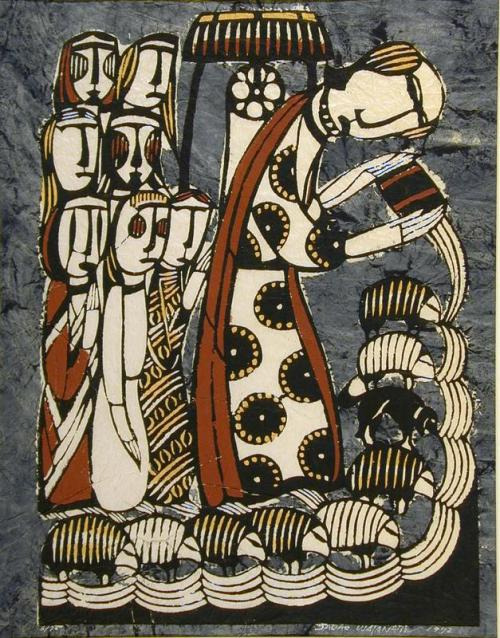
View On WordPress
#exodus#exodus 2#faith#god&039;s timing#impatience#moses#patience#reflection#refocus#renew#return#spiritual life#spiritual maturity#time#time out#timing#wisdom
0 notes
Text
I like how in discussions of "Best Dreamworks Movies" no one ever really talks about Prince of Egypt because it is so self evidently the best one there is nothing to talk about.
#dreamworks#prince of egypt#movies#animated movies#shrek#bible discourses#torah#how to train your dragon#httyd#httyd 2#httyd 3#moses#book of exodus#shrek 2#kung fu panda#kung fu panda 2#megamind#ancient egypt#the bee movie
749 notes
·
View notes
Text
Church notes - 21st May 2023
21st Communion Mark 14:22 - 25
Exodus 1:1 - 2:9 Consumers - 'It's all about me'
'In the long run, if we train consumers instead of communers, we'll end up with customers instead of disciples'
Jesus is calling us to join a Church family and be disciples.
The Israelites in Egypt.
Exodus 1:1 - 17 Population explosion.
The Covenant of Abraham.
God is always at work in the world. God is always at work around you. vs 1:8 New Pharoah enslaves the Israelites. A new Phase - History forgotten. The same is happening today regarding the Christian heritage of Australia. Vs 2:3, 4 God's leading. She knew God had a plan.
Hebrews 11:23
She was relying on God.
Acts 7:20 - 23 God's hand working in the background. God is always at work around you. God invites you to become involved with Him in His work.
A victory is coming.
We need to wait for patience and confidence.
0 notes
Text
DA2 x DATV — Kirkwall Exodus⛵️

Fenris & Eleena Amell Hawke in Kirkwall, 9:52 Dragon feat. their adoptive children, Aveline & Sandal
The process was chaotic but very fun! <3 It was a blast to draw all the mini details I wanted since it's a 4K picture (I usually draw on small canvases to save time XD)
Details:
Aveline is based on her looks in DAI! I gave her Varric's "viscount" crown! She's also using the Templar shield from her first husband <3
The kids in the back are olfer versions of some from that illustration + a new one, since they kept adopting more while saving these runaway slaves QWQ♥
Sandal and his dad takes care of the Hawke Estate when they're away, and the kids too!
One of them carries a copy of one of Varric's book!
Eleena is wearing the necklace I headcanon Fenris gifted her in DA2! A hawk feather and a lyrium heart: a mini storage she can use for emergencies if her mana is low💙
The ship in the back is the same Hawke and her family uses when arriving to Kirkwall in the cutscne: their first Exodus... QWQ (If you didn't know, DA2 could have been called "Exodus" but they stick with "II" instead😔)
Obviously, the red piece of cloth Fenris is using is Hawke's romance "gift" >w< After all these years... ♥
Listen, BioWare didn't give me Fenris in DATV so I had to get the job done by myself haha
#dragon age#da#fanart#dragon age fanart#dragon age the veilguard#oc#datv#lousticart#dragon age 2#fenhawke#fenris#hawke#da2#fenris dragon age#fenris da2#fenris x hawke#female hawke#fem hawke#hawke dragon age#aveline vallen#sandal feddic#kirkwall#exodus
23 notes
·
View notes
Text
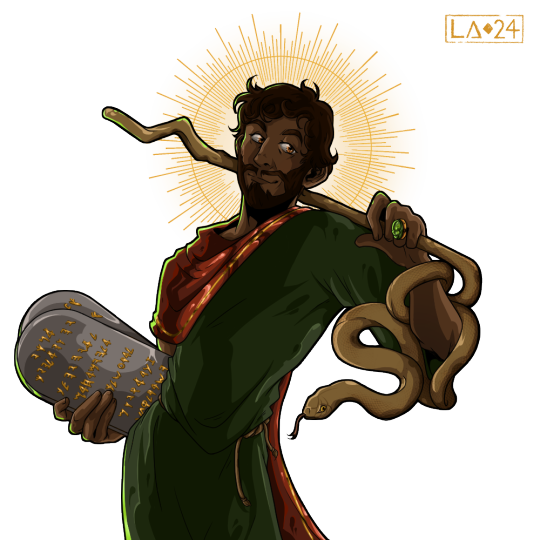
Finished the picture of Moses! Super happy with how this turned out- I think I do want to practice drawing animals a bit more, though.
#art#digital#illustration#game#portrait#color#colour#larkofthewoods#moses#hades#encounters#hades 2#christianity#old testament#exodus#leviticus#Deuteronomy#numbers#the prince of egypt
52 notes
·
View notes